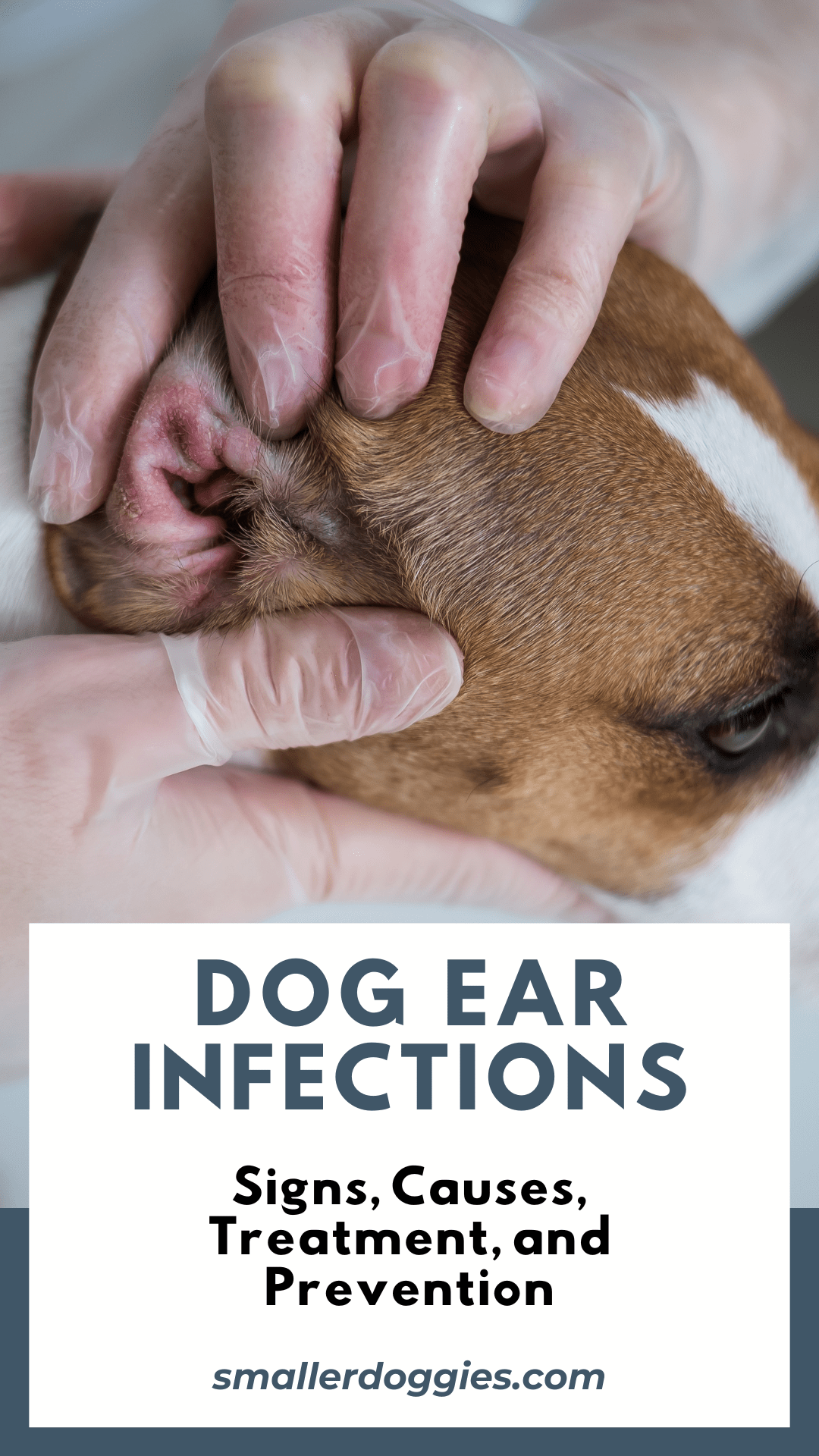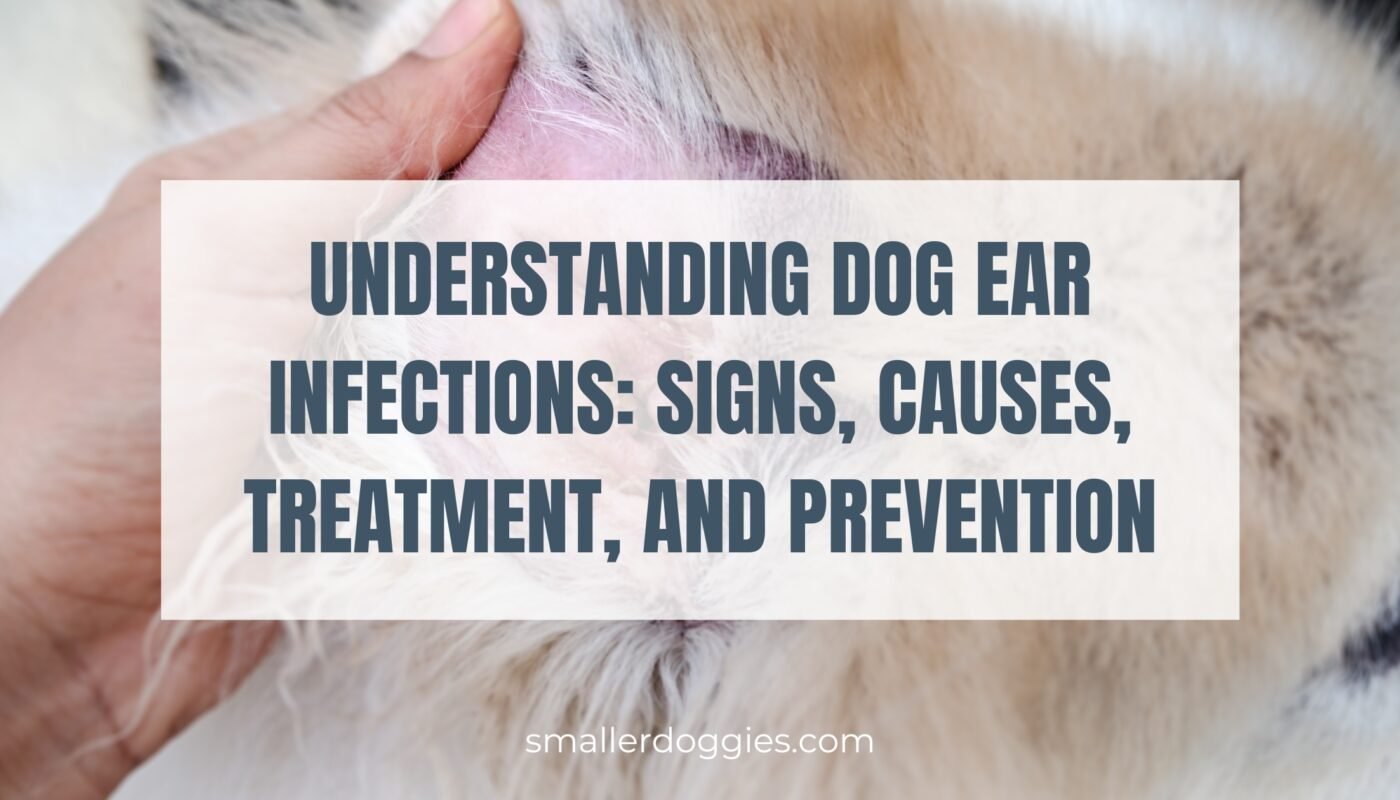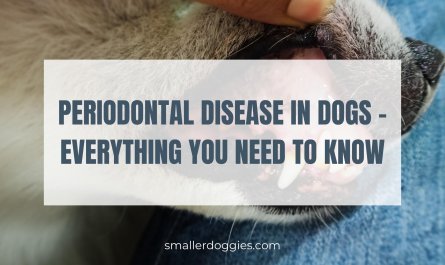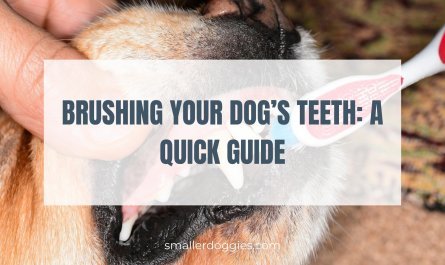Post Disclaimer
This post may contain affiliate links. If you use these links to buy something we earn a commission at no extra cost to you. Smaller Doggies is supported by its audience, Thank you!
If you’ve ever dismissed your dog’s occasional ear scratching as a passing itch, you might be missing a crucial indicator of a deeper issue. When it comes to your furry companion’s well-being, understanding the signs, causes, treatments, and prevention of dog ear infections is paramount.
By unraveling the mysteries behind these common occurrences, you can equip yourself with the knowledge needed to safeguard your pet’s health. So, are you ready to uncover the secrets behind those tell tale ear symptoms and explore how to best care for your canine friend?

Table of Contents
- Recognizing Symptoms of Dog Ear Infections
- Common Causes of Canine Ear Infections
- Effective Treatments for Ear Infections
- Preventing Dog Ear Infections and Ongoing Maintenance
- Complications of Untreated Ear Infections
- At Home Ear cleaning Products For Dogs
- Frequently Asked Questions
- Can Ear Infections in Dogs Be Contagious to Other Pets or Humans?
- Are There Any Specific Breeds That Are More Prone to Developing Ear Infections?
- Can Over-The-Counter Ear Cleaning Products Be Effective in Preventing Ear Infections in Dogs?
- Is It Possible for Ear Infections in Dogs to Recur Even After Successful Treatment?
- How Can a Dog Owner Differentiate Between a Simple Ear Irritation and a Full-Blown Infection That Requires Veterinary Attention?
- Conclusion
Recognizing Symptoms of Dog Ear Infections
Recognizing symptoms of dog ear infections is crucial for early detection and prompt treatment to ensure your furry friend’s health and well-being.
Look out for the following signs:
- Head shaking
- Scratching at the affected ear
- Dark discharge
- Odor
- Redness and swelling of the ear canal.
If you notice any of these symptoms it may be best to schedule a consultation with a veterinarian for a thorough examination.
Your vet may recommend cleaning the ears and prescribe ear drops or medications. In severe cases, oral antibiotics or even surgery like Total Ear Canal Ablation (TECA) may be necessary.
Common Causes of Canine Ear Infections
Common causes of canine ear infections include:
- Bacterial Infections: Bacteria, such as Staphylococcus and Pseudomonas, can proliferate in the warm, moist environment of a dog’s ear canal, leading to infection.
- Yeast Overgrowth: Malassezia is a type of yeast commonly found in the ears of dogs. When it overgrows due to factors like allergies or excessive moisture, it can cause ear infections.
- Ear Mites: Ear mites (Otodectes cynotis) are tiny parasites that can infest a dog’s ears, causing inflammation, itching, and secondary bacterial infections.
- Allergies: Dogs can develop allergies to various environmental allergens, such as pollen, dust mites, or certain foods. Allergic reactions can lead to inflammation and irritation of the ears, predisposing them to infections.
- Anatomy: Dogs with floppy ears, narrow ear canals, or excessive hair in the ears are more prone to ear infections due to poor ventilation and increased moisture retention.
- Foreign Bodies: Objects like grass seeds, foxtails, or debris can become lodged in a dog’s ear canal, causing irritation, inflammation, and infection.
- Excessive Moisture: Dogs that swim frequently or have floppy ears that trap moisture are at higher risk of developing ear infections, as the damp environment provides an ideal breeding ground for bacteria and yeast.
- Hormonal Imbalances: Hormonal imbalances, such as hypothyroidism or Cushing’s disease, can affect a dog’s immune system and predispose them to ear infections.
- Poor Ear Hygiene: Neglecting regular ear cleaning can lead to the build up of wax, debris, and bacteria in the ear canal, increasing the risk of infection.
- Trauma or Injury: Trauma to the ears, such as scratches, bites, or injuries from excessive scratching, can damage the ear canal’s protective barrier, making it more susceptible to infection.
Understanding these common causes can help you take preventive measures to keep your furry friend’s ears healthy and infection-free.
Regular ear cleaning, prompt veterinary care for underlying conditions, and minimizing exposure to moisture are key steps in preventing ear infections in dogs.
Effective Treatments for Ear Infections
To effectively address canine ear infections, it’s essential to understand the various treatment options available after identifying the underlying causes discussed earlier.
Once your veterinarian has diagnosed the specific cause of your dog’s ear infection, they may recommend a treatment plan tailored to your pet’s needs. This plan often involves thorough cleaning of the ears to remove debris and build up, followed by the application of prescribed ear drops or medications.
In cases where the infection is severe or recurrent, oral antibiotics may be necessary to combat the infection effectively. It’s crucial to follow your vet’s instructions carefully and complete the full course of medication as prescribed to ensure the infection is fully eradicated.
In some chronic cases that don’t respond to traditional treatments, surgical options like Total Ear Canal Ablation (TECA) may be considered to provide long-term relief.
Preventing Dog Ear Infections and Ongoing Maintenance
Preventing Dog Ear Infections:
- Thoroughly dry your dog’s ears after swimming or bathing to prevent moisture build up.
- Regularly clean your dog’s ears to remove wax and debris.
- Monitor for signs of allergies and work with your veterinarian to manage them effectively.
- Take precautions to prevent foreign objects from entering your dog’s ears.
- Stay vigilant and address potential causes of infection promptly.
Ongoing Maintenance for Ear Health:
- Regularly inspect your dog’s ears for signs of redness, swelling, or discharge.
- Monitor your dog’s overall health and address any underlying conditions or allergies.
- Maintain a consistent ear care routine to promote long-term ear health and well-being.
- Seek veterinary advice for breed-specific preventive measures, if necessary.
Complications of Untreated Ear Infections
After discussing the preventive measures for dog ear infections, it’s crucial to understand the potential complications that can arise if these infections are left untreated. If left unaddressed, ear infections in dogs can lead to serious consequences.
One major complication is the risk of the infection spreading to the inner ear, causing balance issues and hearing loss. Untreated infections can also progress to chronic otitis externa, where the inflammation becomes long-lasting and difficult to manage.
Moreover, persistent ear infections can result in painful ear hematomas, which are pockets of blood that form in the ear flap due to excessive scratching and head shaking. These hematomas often require surgical intervention to resolve. Additionally, untreated infections may lead to secondary bacterial or yeast infections, further complicating the initial condition and necessitating more aggressive treatment.
In severe cases, untreated ear infections can even cause damage to the ear canal and potentially affect the dog’s overall quality of life. Therefore, prompt veterinary attention and proper treatment are essential to prevent these complications and ensure your dog’s ear health.
At Home Ear cleaning Products For Dogs
Here are the five most common at-home products for dog ear cleaning:
Frequently Asked Questions
Can Ear Infections in Dogs Be Contagious to Other Pets or Humans?
Ear infections in dogs are typically not contagious to other pets or humans. However, it’s essential to consult a vet for proper diagnosis and treatment. Quick action, such as cleaning and medication, can help prevent spread and ensure your dog’s health.
Are There Any Specific Breeds That Are More Prone to Developing Ear Infections?
Certain dog breeds, like Pugs, Basset Hounds, Shih Tzus and Poodles (Toy and Miniature) to name a few are more prone to ear infections due to their floppy ears. Regular ear care, drying after water exposure, and prompt vet attention help prevent issues.
Can Over-The-Counter Ear Cleaning Products Be Effective in Preventing Ear Infections in Dogs?
Yes, over-the-counter ear cleaning products can help prevent ear infections in dogs. Regular use as directed can remove excess moisture and debris, reducing the risk of infection. Consult your vet for guidance on selecting the most suitable product for your dog.
Is It Possible for Ear Infections in Dogs to Recur Even After Successful Treatment?
Yes, ear infections in dogs can recur even after successful treatment. You should stay vigilant for symptoms, continue preventative care, and consult your vet promptly if signs reappear. Consistent ear hygiene and addressing root causes are key.
How Can a Dog Owner Differentiate Between a Simple Ear Irritation and a Full-Blown Infection That Requires Veterinary Attention?
To tell the difference between simple ear irritation and a serious infection in your dog, watch for excessive head shaking, scratching, dark discharge, odor, redness, and swelling. If these signs persist or worsen, promptly consult a vet.
Conclusion
In conclusion, staying vigilant and proactive in monitoring your dog’s ear health is crucial.
By recognizing the signs of ear infections, understanding the causes, and seeking timely treatment, you can ensure your furry friend’s ears stay healthy and happy.
Remember to consult with your veterinarian for proper care and prevention strategies to keep your dog’s ears free from infections.







